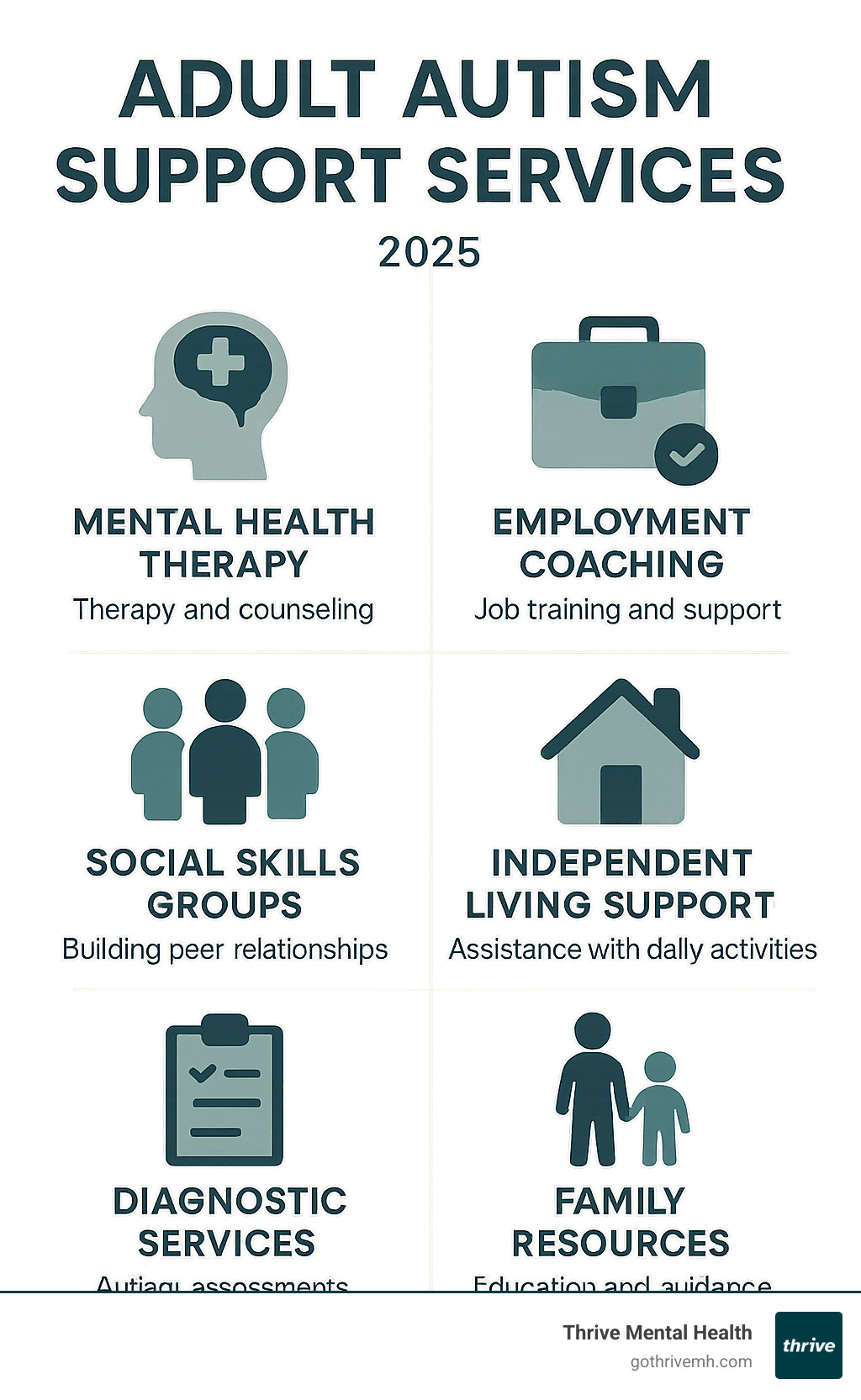Adulting with Autism Made Easier: Finding the Right Support

Why Adult Autism Support Services Are Essential for Thriving in Adulthood
Adult autism support services are specialized programs designed to help autistic adults steer the unique challenges of independent living, employment, relationships, and mental health. As one autistic individual shared, it is not easy “to be ‘different’ in a world that values conformity.”
Key Types of Adult Autism Support Services:
- Mental Health Support: Therapy and counseling for anxiety, depression, and emotional regulation.
- Employment Services: Job coaching, workplace accommodations, and career development.
- Social Support: Peer networks, social skills groups, and community programs.
- Daily Living Support: Independent living skills training, housing assistance, and life planning.
- Diagnostic Services: Adult autism assessments and evaluations.
- Family Support: Resources for caregivers and family members.
The transition to adulthood is challenging for many autistic individuals. Research shows that 92% of autistic adults experience improvements in anxiety and depression with appropriate support. However, many face a “service cliff” after aging out of school-based programs, leaving them to steer adult systems without guidance.
Unlike childhood services focused on education, adult support addresses the full spectrum of independent living, from managing sensory sensitivities to building careers and relationships. The goal isn’t to “fix” autism but to provide tools that help autistic adults build fulfilling, self-directed lives.
I’m Nate Raine, CEO of Thrive Mental Health. I’ve dedicated my career to expanding access to behavioral health services, including specialized support for neurodivergent adults across Florida. I’ve seen how the right support can transform lives, helping autistic adults not just survive, but truly thrive.

Adult autism support services basics:
Understanding the Unique Challenges for Autistic Adults
For many autistic adults, the transition from a structured educational journey to the complexities of the adult world is a stark reality. The challenges they face are often interconnected and less visible than those in childhood.
- Masking and Burnout: Many autistic adults engage in masking—the exhausting process of camouflaging autistic traits to fit in. This constant effort can lead to burnout, a state of profound physical and emotional exhaustion.
- Diagnostic Difficulties: Many adults, particularly women, are diagnosed later in life because traditional diagnostic tools were based on presentations in boys. Without a formal diagnosis, accessing crucial adult autism support services can be difficult.
- Co-occurring Conditions: Anxiety, depression, and ADHD frequently accompany autism, complicating the search for appropriate support. Understanding Functioning Autism Symptoms in Adults offers more insight, and research on co-occurring mental health conditions highlights the prevalence of these challenges.
- Navigating Complex Systems: Adult services for insurance, housing, and healthcare are often fragmented and require significant self-advocacy, a skill that can be challenging for autistic individuals.
The Transition “Cliff”
The “service cliff” is the abrupt end of school-based services upon graduation. For years, students may have had individualized education plans, therapy, and accommodations. Suddenly, this support structure vanishes. The responsibility shifts from the school system to the individual, who must now actively research, coordinate, and advocate for their own care. This sudden need for self-advocacy in an unfamiliar system can trigger significant anxiety and stress.
Mental and Emotional Well-being
The daily effort of navigating a world designed for neurotypical minds means anxiety and depression are common in the autistic community. Sensory overload—from buzzing lights to overwhelming sounds—is a constant battle that drains mental energy. Additionally, managing emotional regulation can be a major challenge, as intense emotions can feel all-consuming and interfere with daily life.
At Thrive Mental Health, we understand these unique challenges. Our virtual and in-person programs in Florida are designed to support neurodivergent adults by working with your neurotype, not against it. We focus on building practical coping strategies for anxiety, depression, and burnout. Learn more about How Mental Health Therapy Can Support Neurodivergent Individuals and see how the right support can improve your mental health journey.
A Spectrum of Support: Types of Adult Autism Support Services
Just as autism is a spectrum, adult autism support services come in many forms. The most effective support is person-centered, creating an individualized plan that builds on your unique strengths and goals by combining different types of services.

Mental Health and Therapeutic Support
Managing mental health is often the foundation for success in other areas of life.
- Cognitive Behavioral Therapy (CBT): Helps identify and shift unhelpful thought patterns to manage anxiety and depression.
- Occupational Therapy: Focuses on practical skills for daily tasks, work, and independent living, including managing sensory sensitivities.
- Speech Therapy: Assists with social communication, from understanding non-verbal cues to navigating workplace conversations.
- Intensive Programs: For those needing more structured care, Intensive Outpatient Programs (IOP) and Partial Hospitalization Programs (PHP) offer comprehensive support. At Thrive Mental Health, our virtual and in-person programs for Florida residents are neurodivergent-affirming and designed to fit your life. Learn more about our Neurodivergent Intensive Outpatient Treatment.
- Medication Management: Can treat co-occurring conditions like anxiety, ADHD, or sleep issues.
Employment and Vocational Services
These services help autistic adults find and maintain meaningful work that aligns with their strengths.
- Job Coaching: Provides personalized support with resumes, interviews, and on-the-job social norms.
- Skill Building: Develops technical abilities and workplace soft skills like time management.
- Workplace Accommodations: Helps identify and advocate for necessary adjustments like noise-canceling headphones or flexible schedules.
- Career Development: Offers long-term guidance for professional growth. The Ready, Willing and Able employment initiative is a great example of successful employment support.
Social, Community, and Peer Support
Finding your community is key to fostering a sense of belonging.
- Social Skills Groups: A safe space to practice conversational skills and build social confidence.
- Peer Networks: Connect you with other autistic adults who share and understand your experiences.
- Special Interest & Mentorship Programs: Create natural social bonds over shared passions or provide guidance from a mentor who has steerd similar challenges.
Find Nearby Neurodivergent Groups for Support to start connecting with your community.
Daily Living and Housing Support
These services build confidence in managing the practical aspects of daily life.
- Independent Living Skills: Training in areas like cooking, household management, and using public transportation.
- Supported Living: Offers varying levels of housing assistance while promoting independence.
- Financial Literacy: Teaches essential skills like budgeting, banking, and managing benefits.
- Life Planning & Respite: Provides guidance for future goals and offers temporary relief for family caregivers.
How to Access and Fund Key Support Services
Finding and funding adult autism support services can feel like a puzzle, but you don’t have to solve it alone. With self-advocacy and strategic navigation, you can piece together the support you need.

Getting a Diagnosis as an Adult
A formal diagnosis can be validating and is often required to access certain services. If you pursue an assessment, find a professional experienced with adult autism, as it can present differently than in children. The process typically involves detailed interviews about your developmental history and current experiences. Even before a formal diagnosis, self-identification can be a powerful step toward understanding your needs and finding community. For guidance, see our guide on Choosing the Right Neurologist for Autism Diagnosis: A Comprehensive Guide.
Navigating Funding and Financial Options for adult autism support services
While services can be costly, several funding options exist.
- Insurance Coverage: This is often the best starting point for mental health care. At Thrive Mental Health, our IOP and PHP programs are in-network with most major commercial insurance plans, making our virtual and in-person care accessible for Florida residents.
- Medicaid: Eligible individuals may receive coverage for behavioral health and daily living supports. Check your state’s specific offerings on the Information on Medicaid services website.
- State Programs: In Florida, the Agency for Persons with Disabilities (APD) provides services for eligible autistic adults, though waitlists can exist. Other states have similar agencies.
- Other Options: Look into scholarships and grants from autism organizations or ask providers about private pay options like sliding-scale fees.
The Role of Family and Caregivers
Family and caregivers play a vital role in the support system. Their involvement can include:
- Advocacy: Helping to communicate needs and steer systems, always with the goal of supporting the person’s own voice.
- Emotional Support: Providing a consistent, understanding presence is invaluable.
- System Navigation: Assisting with the administrative tasks of finding providers and understanding eligibility.
It’s crucial for caregivers to prevent burnout by seeking their own support and taking breaks. Our guide on Parenting Neurodivergent Children: Essential Tips and Advice has insights that are also applicable to supporting adults.
Creating Inclusive Futures: Best Practices and Trends
The landscape of adult autism support services is evolving from rigid, clinical models to more personalized and genuinely supportive approaches. This shift is driven by several key trends.
At the heart of this evolution is neurodiversity-affirming care. This philosophy rejects the idea of “fixing” autism and instead celebrates the unique strengths and perspectives of autistic individuals. At Thrive Mental Health, our programs are built on this foundation, focusing on strengths and creating a safe space where authenticity is celebrated.
Other important trends include client-led programs, where autistic adults have a direct voice in shaping their support, and a push for genuine community integration that fosters a sense of belonging. The importance of autistic voices in designing and evaluating services is now recognized as essential for creating support that is truly effective.
Technology and telehealth have also been game-changers. For many autistic adults, virtual therapy removes barriers like sensory overwhelm and stressful commutes. The flexibility of our virtual IOP and PHP programs allows individuals across Florida—from Tampa Bay to Central Florida—to access intensive support from the comfort of home, without disrupting their daily lives.
Key Components for Successful Programs:
- Individualized & Strength-Based: Tailors support to each person’s needs and abilities.
- Neurodiversity-Affirming: Respects autism as a natural variation, focusing on support over correction.
- Led by Trained Professionals: Ensures staff have specialized, affirming knowledge.
- Fosters Peer Connection: Creates opportunities for authentic relationships with other autistic adults.
- Focuses on Real-World Skills: Provides practical strategies for daily life.
These elements create holistic care that helps autistic adults thrive. For more insights, explore Best Practices for Supporting Autism Spectrum Disorder.
Frequently Asked Questions about Adult Autism Support Services
Navigating adult autism support services can bring up many questions. Here are answers to some of the most common ones we hear.
What is the first step to getting support as an autistic adult?
Start by assessing your needs: are you struggling with mental health, employment, or social connection? Next, research local and virtual providers who specialize in adult autism. Seeking a formal diagnosis can be helpful, as it may be required for certain services. Finally, reach out for an initial consultation. Many organizations, including Thrive Mental Health, offer introductory calls to discuss your needs and see if our virtual and in-person programs for Florida residents are a good fit.
Are there support services for autistic adults without an intellectual disability?
Yes, absolutely. Many autistic adults without an intellectual disability (sometimes referred to as having Level 1 autism) benefit greatly from support. Services are designed to address challenges with anxiety, depression, burnout, executive functioning, and social communication. Key supports include mental health counseling, executive function coaching, career services, and peer social groups. At Thrive Mental Health, our Florida-based programs are custom to these specific needs. These services recognize that intellectual ability doesn’t eliminate the daily challenges of being autistic. For more on this, see our guide on Effective Strategies for Counselling Autistic Adults.
How can I find support groups for autistic adults in Florida?
Finding your community in Florida is achievable. Start by checking online directories from national organizations and local resources like the Autism Society of Florida. Also, look into local resource centers and university psychology programs in cities like Tampa Bay and St. Petersburg. Don’t forget virtual groups, which expand your options and can be more comfortable if you experience social anxiety or sensory sensitivities. Keep exploring until you find a group that feels like the right fit.
Conclusion
The journey to a fulfilling adulthood with autism is one you don’t have to take alone. The landscape of adult autism support services is shifting from outdated models toward neurodiversity-affirming approaches that empower individuals and build on their strengths. From mental health care to employment coaching and peer networks, these services are stepping stones to greater independence and well-being.
The key is finding support that is right for you—services that honor your needs, communication style, and goals. Seeking support is an act of courage and self-advocacy.
At Thrive Mental Health, our virtual and in-person IOP and PHP programs are designed with this philosophy. We provide flexible, individualized adult autism support services for residents in Florida, including Tampa Bay, St. Petersburg, and Central Florida. Our care honors your neurotype and builds on your strengths to create lasting, positive change.
Your future is bright. With the right support, you can build community, develop your skills, and create the life you envision. To learn how we can help you on this path, explore our Comprehensive Autism Therapy From Personalized Treatments to Online Support Programs.